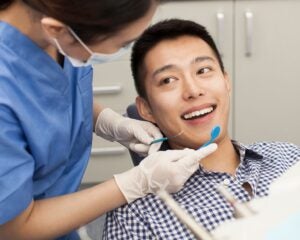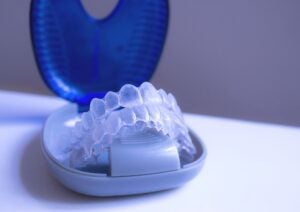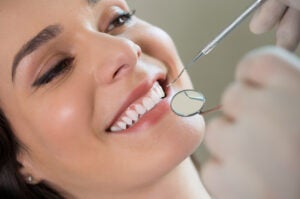-
11 Common Dental Problems

Are you self-conscious about your smile? Do you want to prevent oral health problems before they start? Learning about common tooth and gum issues goes a long way toward keeping your smile healthy and beautiful. Here are 11 of the most prevalent dental problems you should know about.
- Cavities: When plaque builds up, it slowly destroys the hard outer layer of your teeth, known as enamel. Soon, a hole forms. The decay continues to spread until you get a filling.
- Gum disease: Red, tender gums that bleed easily when you floss are a sign of gum disease. The early stage, known as gingivitis, is easy to reverse, so act quickly if you suspect a problem.
- Staining and discoloration: Dark-colored foods, tea and coffee, tobacco, certain medications, and traumatic injury can stain or discolor your teeth. Routine cleanings, whitening, and veneers are all options for restoring a bright, white smile.
- Sensitivity: Teeth can become sensitive to hot and cold temperatures because of worn enamel, exposed roots, fractures, and more. Brushing with desensitizing toothpaste may help.
- Crooked teeth: Around 75 percent of the population has either worn braces or could benefit from straightening their teeth. Invisalign is a convenient, nearly invisible way to achieve the smile you’ve always wanted.
- Gaps between the teeth: If two or more of your teeth don’t quite touch, you can close the gap with Invisalign or other orthodontic procedures. You can also instantly correct the issue with cosmetic solutions like bonding or veneers.
- Toothaches: If you experience a sudden pain in one or more teeth, set an appointment with an emergency dentist right away. In the meantime, rinse with warm salt water and take over-the-counter pain relievers.
- Chipping and cracking: Enamel is the hardest substance in the human body, but it can still chip and crack under traumatic circumstances. Your dentist may recommend a crown, bonding, or root canal followed by a crown or veneer.
- Impaction: Impacted teeth are those that fail to erupt through the gums. This is common with wisdom teeth. Depending on your situation, you may need oral surgery.
- Nighttime tooth grinding: Known as bruxism, this condition can cause headaches, jaw soreness, cracked teeth, or receding gums. Ask your dentist to fit you with a custom mouthguard to protect your smile.
- Bad breath: In about 85 percent of people with chronic bad breath (also called halitosis), an underlying dental condition is to blame. Keep your mouth clean and fresh by brushing, flossing, rinsing with therapeutic mouthwash, and visiting the dentist regularly.
These common dental problems are no fun, but fortunately, you can prevent most of them with good at-home oral care and routine dentist appointments. For personalized tips to keep your smile healthy and bright, or to schedule your next dental exam and cleaning, please contact Park 56 Dental at (212) 826-2322. We are the best dentist in NYC, offering a spa-like experience that makes going to the dentist a pleasure!
-
How to Care for Your Invisalign Aligners

One of the most significant benefits of Invisalign is that you can remove it to eat and drink. Unlike metal braces, this means there are no dietary restrictions, so you can eat whatever you want while straightening your smile with nearly invisible plastic aligners! Still, keeping the aligners clean is an important part of your treatment plan. With proper care, you’ll keep your Invisalign clear, odorless, and free of bacteria buildup. Here’s what you need to know.
Rinse Your Aligners Whenever You Take Them Out
Rinsing your aligners helps remove saliva, bacteria, and plaque before putting them in their storage case. This is an important step even if you’re not at home, so be sure to locate a drinking foundation or bathroom sink before removing your Invisalign.
Remember, you should take out your aligners to eat and drink anything other than water. Otherwise, the clear plastic is liable to stain. Still, you should wear your aligners for at least 22 hours a day to ensure your treatment stays on schedule, so refrain from snacking too often.
Clean Your Invisalign Morning and Night
When brushing your teeth before bed and after waking up each morning, clean your Invisalign as well. This involves brushing the aligners with a soft toothbrush (different from the one you use on your teeth) with clear, anti-bacterial liquid soap. It may seem counterintuitive, but you should not use toothpaste to brush Invisalign aligners. Doing so could cloud the plastic and make it appear more visible in your mouth.
Invisalign care also involves soaking the aligners in a cup of manufacturer-provided cleaning crystals dissolved in lukewarm water. Soak for 15 minutes once a day to keep your aligners sanitized and odor-free.
Brush After Eating
Proper Invisalign care isn’t just about cleaning the aligners—it’s also about having good oral hygiene. In addition to brushing and flossing each morning and night, Invisalign wearers should make a habit of brushing after each meal or snack before putting the aligners back in. This prevents trapping food particles against your teeth, which could lead to cavities and staining. If brushing isn’t an option, rinse your mouth out thoroughly with water.
Store Your Invisalign Aligners in a Dedicated Case
Whenever you remove your aligners, put them in their case immediately. Otherwise, you risk damaging, losing, or accidentally throwing away your Invisalign. This tip applies even when you’re out and about, so it’s helpful to have two cases—one for at home and one for on-the-go.
Remember to keep your Invisalign case clean as well. Once a week, brush the case with the same toothbrush and soap you use with your aligners. Let the case air dry before closing it again.
If you have more questions about caring for Invisalign, or you’re ready to straighten your smile using this cutting-edge technology, please contact Park 56 Dental at (212) 826-2322. We offer a complimentary consultation with our knowledgeable dentist so you can find the answers you seek before moving forward with your Invisalign treatment.
-
Why it’s Important to Have Your Teeth Professionally Cleaned Regularly

Routine dentist visits include an oral exam and professional teeth cleaning. Performed by a licensed and registered dental hygienist, cleanings remove stains and buildup to brighten and protect your smile.
Unfortunately, almost one-third of Americans forgo routine teeth cleanings, which the American Dental Association recommends getting at least once every six months. If you think brushing and flossing are just as good as professional cleanings, think again! Here’s what can happen if you skip your routine dentist visits.
- Increased risk of staining and cavities: Even if you’re diligent about at-home oral care, cavities can still develop. You need help clearing away tooth-staining, cavity-causing plaque and tartar that are nearly impossible to remove without professional tools.
- Greater chance of gum disease: Plaque and tartar can also build up along the gum line, irritating this soft tissue and causing periodontal pockets to form. If you never have your teeth professionally cleaned, bacteria, food particles, and plaque could collect in these pockets, further irritating your already-sensitive gums.
- Untreated bad breath: Hard-to-reach bacterial deposits may cause bad breath. You can temporarily mask the unpleasant odor with mints, gum, or mouthwash, but the only way to tackle this problem head-on is to have your teeth professionally cleaned.
- Undiagnosed oral health problems: Some dental emergencies occur quickly and noticeably, including traumatic injuries, loose crowns, and fractured teeth. Others develop more slowly, such as cavities, abscesses, and oral cancer. With routine dental exams, you can receive an early diagnosis and begin treatment for any developing health problems.
- Complications during pregnancy: It’s more important than ever to see a dentist when you’re pregnant. Because of unprecedented hormone fluctuations, you have an even higher risk of cavities, gum disease, tooth erosion, and other problems if you skip your cleanings as an expecting mother.
- Risks to your overall health: Neglecting routine oral care can put other aspects of your health at risk. For instance, the oral bacteria associated with gum disease are linked to an increased risk of cardiovascular disease, respiratory infections, rheumatoid arthritis, and other conditions. Protect your overall well-being by keeping your teeth and gums healthy with professional cleanings.
- Potential tooth loss: If allowed to progress, gum disease can eventually weaken the bone structure that holds your teeth in place. In severe cases, your teeth may even start to fall out. Don’t let it come to this! Get your teeth professionally cleaned twice a year to maintain a healthy, beautiful smile.
Even if it’s been years since you’ve been to the dentist, it’s never too late to go in for a dental cleaning! The sooner you commit to taking better care of your smile, the better chance you have of avoiding the complications outlined above.
Are you looking for the best dentist in NYC? Come to Park 56 Dental! Our spa-like office, caring staff, and experienced dental professionals make going to the dentist a pleasure. Contact us online or call (212) 826-2322 to schedule your first visit with us today.
-
How to Stop Drinking Soda and Other Sugary Drinks

Soda and other sugar-sweetened beverages are highly popular in the United States. According to the CDC, about half of all adults and 63 percent of teens consume at least one sugary drink every day. Despite its popularity, most people know that drinking soda is unhealthy. The empty calories and sugar in soda are linked to obesity, diabetes, weight gain, and various chronic conditions. Soda also hurts your teeth. Sugar and acid (found in both regular and diet soda) erode protective tooth enamel and lead to cavities.
If you have a goal to stop drinking soda, you may be unsure how to overcome your cravings. Follow these tips to lower your sugary drink intake and benefit your oral and overall health.
- Drink more water: Sometimes, you may crave soda if you’re simply thirsty. Drink a tall glass of water and see if the craving subsides. Water is exactly what your body needs to stay hydrated without any added sugar, acidity, calories, or artificial colors and sweeteners.
- Stop buying soda: Make it harder to give in to your cravings by never keeping soda in the house. This may require you to get the whole family on board with your goal to stop drinking sugary drinks.
- Replace soda with healthy alternatives: Curb your soda cravings by drinking flavored sparkling water, kombucha, green tea, or coconut water. You may find these satisfy your craving better than plain water because they more closely resemble soda. However, don’t replace soda with fruit juice, which can have a surprising amount of added sugar and empty calories.
- Curb your cravings: Take your mind off soda by chewing gum or snacking on a sweet, healthy treat, such as apple slices, berries, grapes, yogurt, or a smoothie.
- Manage your stress levels: Stress can induce cravings for soda and other unhealthy food. As a result, stressed individuals tend to consume more calories than non-stressed people. Healthy ways to manage stress include physical exercise, yoga, meditation, aromatherapy, journaling, and counseling.
- Create a support system: If you’re serious about not drinking soda, don’t keep it a secret. Tell your friends and family so they can help you stay accountable. Sharing your goal also gives you people to talk to when a craving strikes.
- Drink in moderation: If you decide to have soda occasionally, limit the damage by having no more than one drink per day. Also, avoid drinking soda close to bedtime, use a straw, and rinse your mouth with water afterward. Wait to brush for at least 30 minutes so your acid-attacked teeth have time to recover before you subject them to the friction of your toothbrush.
Whether you cut out soda entirely or continue to drink it in moderation, regular dental cleanings are vital for maintaining a healthy smile. Contact Park 56 Dental at (212) 826-2322 to schedule your next visit to our NYC dentist office. We provide services in a spa-like environment to ensure your complete comfort and satisfaction.
RECENT POSTS
categories
- Uncategorized
- Cosmetic Dentistry
- Veneers
- Healthier Teeth
- Teeth Whitening
- Dental Health
- Video
- Dental Emergencies
- Invisalign
- Dental Implants
- Root Canal
- Sedation Dentistry
- Infographic
- Dental Crowns and Bridges
- Dental Anxiety
- Gum Disease
- COVID-19
- Bad Breath
- New York Dentist
- Cut out sugar
- General Dentistry
- Oral Health
- Oral Cancer
- Dry Mouth
- Gum Health
- Toothache
- Dental Sealants
- Cavities
